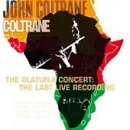
http://www.kindamuzik.net
ernaast
Onze laatste liverecensie.
Onze laatste albumrecensie.
Ons laatste interview.
Onze laatste video.
John Coltrane | The Olatunji Concert: The Last Live Recording
His last live recording, beautiful and painful at the same time.
CD, Impulse
Tekst: Bas Ickenroth
Publicatiedatum: 13 november 2001

If John Coltrane would have lived as long as Miles Davis, his influence could have been at least as large as that of Miles'. But unfortunately, John Coltrane died in 1967 from liver cancer, only forty years old, leaving an immense gap that still hasn't been filled today. He gained his popularity in the first Miles Davis quintet in the middle and end of the fifties, went on as a bandleader himself in the late fifties, making fairly traditional but beautiful jazz. In the years to come, his music and playing became more and more free, and while searching for spirituality, he became one the most important forces of free jazz. Especially the last two years of his life he made typical free jazz, very abstract and atonal. It was difficult music back then, and it still is today. This album, recorded only three months before his untimely death, is the last live recording of John Coltrane ever. And only for that reason alone this album is a definite must have. Sharing the stage with Pharaoh Sanders, his wife Alice, Jimmy Garrison, Rashied Ali and Algie DeWitt, he performs two tracks, both clocking around thirty minutes. The first track 'Ogunde' is a vulgar display of power by the whole ensemble, a constantly ongoing wall of music that is both passionate and disturbing at the same time. The African sounding main theme only appears in the beginning, the rest of the music is free jazz at its purest. On the verge of jazznoise. Secondly 'My Favourite Things' comes by, and that song originally comes ofcourse from the musical 'The Sound of Music'. 'My Favourite Things', recorded in a brilliant version by John Coltrane before in 1961 on the same titled album, starts of with a double-bass solo by Jimmy Garrison, who shows singlehandedly that improvisational music can be calm, melodic and spiritual. After more than seven minutes, the rest of the ensemble comes falling in. A tremendously beautiful free jazz piece follows, with John Coltrane showing that he needs no frame for his music, no limitations to his feelings, that he posseses total freedom while performing. A big support to the still oppressed black community back then. The main theme of 'My Favourite Things' comes by a couple of times in this performance, but most of these times they are almost unrecognisable. While his first rendition of the song in 1961 was very free and loose for that time period, here it becomes a vehicle for search for spirituality. Incredibly impressive, but very, very difficult. Especially when combined with this sloppy sound, which makes that the noisy outbursts become even more noisy due to failing recording equipment. But that would be the only negative remark I'm able to make about this very important document.
http://www.kindamuzik.net/recensie/john-coltrane/the-olatunji-concert-the-last-live-recording/1062/
Meer John Coltrane op KindaMuzik: http://www.kindamuzik.net/artiest/john-coltrane
Vind je John Coltrane goed? Lees dan ook bij KindaMuzik over:
» Teeth Of Lions Rule The Divine» Miles Davis
» Herbie Hancock








Deel dit artikel: